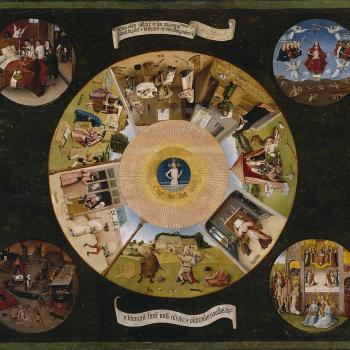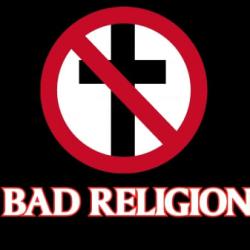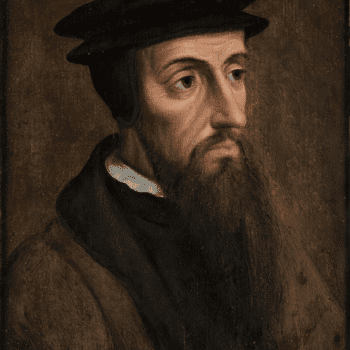Calvin Claims That the Catholic Church Requires Formal Confession of Every Venial Sin (!)
This is an installment of a series of replies (see the Introduction and Master List), starting with #56, to portions of Book III of Institutes of the Christian Religion, by early Protestant leader John Calvin (1509-1564). I utilize the public domain translation of Henry Beveridge, dated 1846, from the 1559 edition in Latin; available online. Calvin’s words will be in blue. All biblical citations (in my portions) will be from RSV unless otherwise noted.
Related reading from yours truly:
Biblical Catholic Answers for John Calvin (2010 book: 388 pages)
A Biblical Critique of Calvinism (2012 book: 178 pages)
Biblical Catholic Salvation: “Faith Working Through Love” (2010 book: 187 pages; includes biblical critiques of all five points of “TULIP”)
John Calvin: Catholic Appraisal (Web Page)
Calvinism & General Protestantism: Catholic Critique (Web Page)
*****
III, 4:15-18
*****
What say the Roman theologians? That all persons of both sexes, so soon as they shall have reached the years of discretion, must, once a year at least, confess all their sins to their own priest; . . . (III, 4:15; my bolding and italics)
. . . that all sins are to be enumerated . . . [is a thing] impossible to bear. Are all sins to be enumerated? But David, who, I presume, had honestly pondered with himself as to the confession of his sins, exclaimed, “Who can understand his errors? Cleanse thou me from secret faults,” (Ps. 19:12); and in another passage, “Mine iniquities are gone over my head: as a heavy burden they are too heavy for me,” (Ps. 38:4). He knew how deep was the abyss of our sins, how numerous the forms of wickedness, how many heads the hydra carried, how long a tail it drew. Therefore, he did not sit down to make a catalogue, but from the depth of his distress cried unto the Lord, “I am overwhelmed, and buried, and sore vexed; the gates of hell have encircled me: let thy right hand deliver me from the abyss into which I am plunged, and from the death which I am ready to die.” Who can now think of a computation of his sins when he sees David’s inability to number his? (III, 4:16; my bolding and italics)
By this ruinous procedure, the souls of those who were affected with some sense of God have been most cruelly racked. First, they retook themselves to calculation, proceeding according to the formula given by the Schoolmen, and dividing their sins into boughs, branches, twigs, and leaves; then they weighed the qualities, quantities, and circumstances; and in this way, for some time, matters proceeded. But after they had advanced farther, when they looked around, nought was seen but sea and sky; no road, no harbor. The longer the space they ran over, a longer still met the eye; nay, lofty mountains began to rise, and there seemed no hope of escape; none at least till after long wanderings. They were thus brought to a dead halt, till at length the only issue was found in despair. . . . The dreadful voice, therefore, was always heard pealing in their ears, “Confess all your sins,” and the dread thus occasioned could not be pacified without sure consolation. Here let my readers consider whether it be possible to take an account of the actions of a whole year, or even to collect the sins committed in a single day, seeing every man’s experience convinces him that at evening, in examining the faults of that single day, memory gets confused, so great is the number and variety presented. (III, 4:17; my bolding and italics)
. . . they are wholly occupied with the enumeration of their sins . . . Nor does it belong to the priest to know for certainty whether or not a sinner is loosed, but to Him from whom acquittal is asked; since he who only hears can ever know whether or not the enumeration is full and complete. (III, 4:18; my italics)
Now, the edition I cite is dated 1559, which was the year of the definitive Latin edition of the Institutes. It was then translated into English by Henry Beveridge in 1846. But the writing comes from 1559. Calvin had been writing treatises against the decrees of Trent as far back as 1547. So he was certainly aware of Session XIV of the Council of Trent (25 November 1551), which occurred eight years earlier, and produced On the Most Holy Sacrament of Penance and Extreme Unction. Chapter 5: On Confession, states:
. . . our Lord Jesus Christ, when about to ascend from earth to heaven, left priests His own vicars, as presidents and judges, unto whom all the mortal crimes, into which the faithful of Christ may have fallen, should be carried, in order that, in accordance with the power of the keys, they may pronounce the sentence of forgiveness or retention of sins. . . . Whence it is gathered that all the mortal sins, of which, after a diligent examination of themselves, they are conscious, must needs be by penitents enumerated in confession, . . . For venial sins, whereby we are not excluded from the grace of God, and into which we fall more frequently, although they be rightly and profitably, and without any presumption declared in confession, as the custom of pious persons demonstrates, yet may they be omitted without guilt, and be expiated by many other remedies. . . . in the Church nothing else is required of penitents, but that, after each has examined himself diligently, and searched all the folds and recesses of his conscience, he confess those sins by which he shall remember that he has mortally offended his Lord and God: whilst the other sins, which do not occur to him after diligent thought, are understood to be included as a whole in that same confession; for which sins we confidently say with the prophet; From my secret sins cleanse me, O Lord. (my bolding and italics)
See the vast difference there? Calvin sets up the straw man / myth of the supposed obligation of all Catholics to confess to a priest absolutely every sin, whether mortal or venial. But we see that the Council of Trent — eight years before the final Latin edition of his Institutes, which I am utilizing(in translation) — commanded no such thing (and even minimally catechized Catholics today understand this). It was and is only mortal sins that were and are required to be confessed to a priest.
Calvin, in III, 4:28: ten sections later, writes about the Catholic distinction between mortal and venial sins, which he calls an “absurd distinction” which Catholics use in order to “insult and trifle with God.” He disagrees with it (despite the fact that it is massively biblical), but that’s beside the point. Catholics do believe in mortal sin, so in a critique of our views on confession, which always involve this very distinction, Calvin must take it into account, if he is to honestly research and intelligently criticize our view in this regard.
If the Catholic Church and Catholics believe in two major categories of sin, and the Church commands only the confession of sins in one of the two categories, that’s obviously not a demand to confess all sins (down to stealing from the cookie jar), is it? Calvin knows all this. He is engaging in sophistry and mythmaking of the most contemptible and inexcusable kind. I took him to task over his arguments regarding this issue, over ten years ago: Mortal and Venial Sin (vs. Calvin #56) [2012].
It’s easy to make something hideous and ridiculous and to mercilessly mock it, when the thing is a fictional invention of one’s own imagination, ain’t it? But is it honest and ethical to do so? Shame on Calvin. This is deliberate lying, and I fail to see how anyone could possibly think otherwise, because John Calvin wasn’t stupid.
***
Practical Matters: Perhaps some of my 4,200+ free online articles (the most comprehensive “one-stop” Catholic apologetics site) or fifty-one books have helped you (by God’s grace) to decide to become Catholic or to return to the Church, or better understand some doctrines and why we believe them.
Or you may believe my work is worthy to support for the purpose of apologetics and evangelism in general. If so, please seriously consider a much-needed financial contribution. I’m always in need of more funds: especially monthly support. “The laborer is worthy of his wages” (1 Tim 5:18, NKJV). 1 December 2021 was my 20th anniversary as a full-time Catholic apologist, and February 2022 marked the 25th anniversary of my blog.
PayPal donations are the easiest: just send to my email address: apologistdave@gmail.com. You’ll see the term “Catholic Used Book Service”, which is my old side-business. To learn about the different methods of contributing, including 100% tax deduction, etc., see my page: About Catholic Apologist Dave Armstrong / Donation Information. Thanks a million from the bottom of my heart!
***
Photo credit: Historical mixed media figure of John Calvin produced by artist/historian George S. Stuart and photographed by Peter d’Aprix: from the George S. Stuart Gallery of Historical Figures archive [Wikimedia Commons / Creative Commons Attribution-Share Alike 3.0 Unported license]
***
Summary: John Calvin argues that Catholic confession requires a comprehensive confession of every sin, no matter how small. I prove that Trent taught otherwise.

















